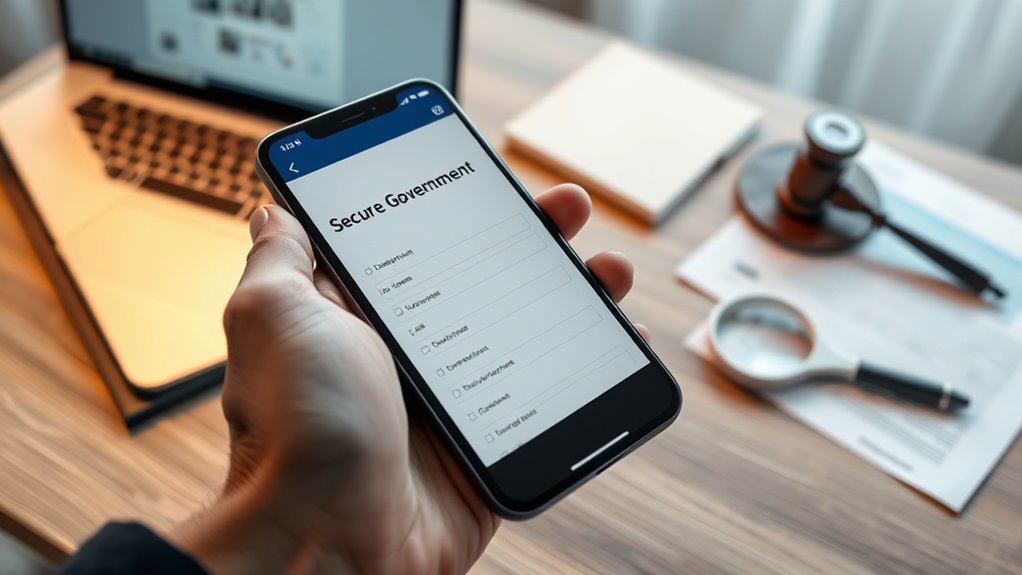To check for warrants on yourself discreetly, start by visiting official online government or law enforcement websites for your jurisdiction, as many provide free access to arrest and warrant records. You can also use third-party background check services that compile public records without alerting authorities, but be mindful of fees. Use specific search terms like your name and location to narrow results. If you want to uncover more details safely, keep exploring these options carefully.
Key Takeaways
- Use official online government portals to privately check for warrants without alerting authorities.
- Search for your name and details on county or city court websites to find active warrants discreetly.
- Employ third-party background check services that provide confidential reports on warrants and criminal records.
- Perform anonymous online searches combining your name with “warrant” and jurisdiction to gather public info silently.
- Avoid calling law enforcement directly; focus on online resources and private services to prevent alerting police.

Ever wondered how to find out if there’s a warrant out for your arrest or someone else’s? The good news is, there are discreet ways to conduct a warrant search without alerting law enforcement. One of the safest methods involves utilizing online arrest records, which are publicly accessible in many jurisdictions. These records often include details about active warrants, arrests, and court cases. By searching official government websites or specific online databases, you can verify whether a warrant exists without having to visit a police station or court in person. Many counties and states have online portals dedicated to criminal records, making it straightforward to perform warrant searches at your convenience and from the privacy of your home.
To begin, identify the correct jurisdiction where the warrant might have been issued. This could be the county or city where the individual lives or where the alleged incident occurred. Once you know the jurisdiction, visit the official law enforcement or court website, which typically provides a warrant search tool or access to arrest records. These tools are often user-friendly, requiring only basic information such as a name, date of birth, or case number. Be cautious when inputting personal details to verify accuracy, as incorrect information can lead to false results or missed warrants. Additionally, understanding your rights and privacy laws related to public records can help ensure your search remains compliant with legal standards.
Start by identifying the relevant jurisdiction and visiting official law enforcement or court websites for warrant information.
If online arrest records aren’t available or don’t provide the details you need, consider third-party background check services. Many of these services compile data from various public records and can offer thorough reports on warrants, arrests, and criminal history. While some of these services may charge a fee, they’re generally designed to be discreet, allowing you to check for warrants without raising suspicion. Just keep in mind that the accuracy of third-party records can vary, so cross-referencing multiple sources is advisable.
In many cases, warrant search methods can be as simple as performing a quick online search with the individual’s name and the word “warrant” along with the relevant jurisdiction. This can sometimes lead you to news reports or court notices that confirm or deny the existence of a warrant. Remember, if you find a warrant against yourself or someone else, it’s essential to handle the situation carefully. Consulting a qualified attorney can help you understand your options and navigate the legal process without unnecessary risk.
Ultimately, checking for warrants discreetly is about using available online resources and public records responsibly. By leveraging online arrest records and warrant search methods, you can stay informed while maintaining your privacy. Just ensure your searches are respectful of privacy laws and conducted with genuine intent, especially if you’re concerned about legal repercussions or need to resolve outstanding issues quietly. Being aware of public record access laws and procedures in your jurisdiction can further assist in conducting a safe and effective warrant search.
Frequently Asked Questions
Can I Check for Warrants Anonymously Online?
You might wonder if you can check for warrants anonymously online. While some websites claim to offer this service, be cautious about your online privacy and legal risks. Many sites may not be secure or could share your info, putting your privacy at risk. It’s safer to use official government databases or consult a legal professional to verify warrants without exposing yourself to unnecessary dangers or privacy breaches.
Are Warrant Checks Free or Do They Cost Money?
You might be surprised to learn that warrant checks can either be free or involve legal fees. Many online background checks offer free initial searches, but detailed warrant information often costs money. If you’re concerned about hidden costs, confirm if the service charges legal fees or other fees before proceeding. Doing your research ensures you get accurate info without unexpected expenses, helping you stay informed without unnecessary costs.
How Often Should I Check for New Warrants?
You should check for new warrants regularly, ideally every few months, to stay updated on warrant renewal and warrant expiration dates. Frequent checks help you catch any recent warrants early, reducing potential legal issues. If you notice a warrant is close to expiration or renewal, take prompt action to address it. Staying proactive guarantees you’re aware of your legal status and can avoid surprises or escalations.
Will Checking for Warrants Affect My Credit Score?
Did you know your credit report can influence your financial decisions? Checking for warrants won’t impact your credit score or credit report, as warrant impact isn’t reflected there. It’s a common misconception that warrant checks could harm your credit; however, they’re separate issues. When you verify your warrant status, you’re not affecting your credit standing. Rest assured, your credit report remains unchanged by warrant inquiries, so you can check safely without risking your credit health.
Can I Be Arrested Immediately After Discovering a Warrant?
You might be arrested immediately after discovering a warrant, especially if it’s active and hasn’t expired. Warrant expiration varies, so it’s vital to address it promptly. If you’re unsure or worried, seek legal representation before turning yourself in, as an attorney can advise you on your rights and help negotiate your surrender, reducing the risk of immediate arrest. Acting quickly can also prevent the warrant from remaining active longer.
Conclusion
Remember, nearly 80% of warrants are issued for missed payments or minor offenses, not violent crimes. Checking for warrants yourself is a smart way to stay informed and avoid surprises. By regularly verifying your status through official channels, you can address issues proactively and maintain peace of mind. Don’t wait until it’s too late—staying proactive about your legal status protects your rights and helps you avoid unnecessary trouble down the line.









